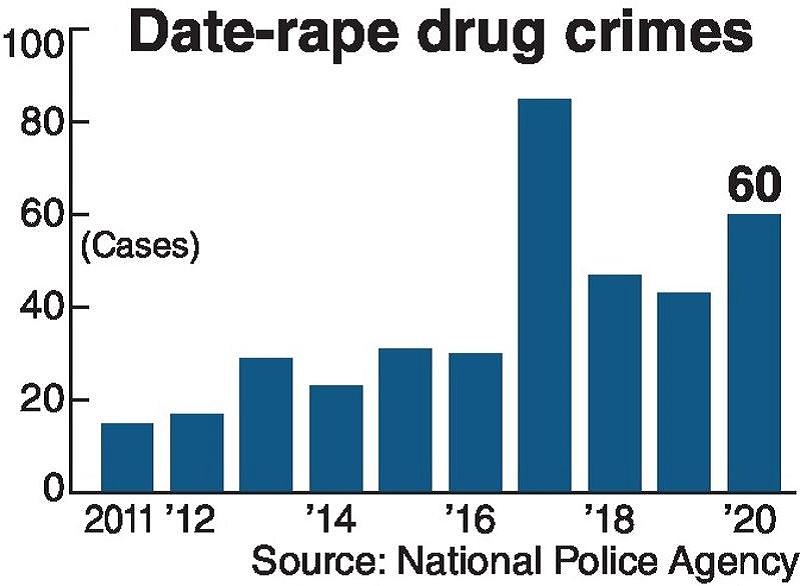
https://japannews.yomiuri.co.jp/wp-content/uploads/5b65f89ed4f3eca7d11df2c0d15d1a17-1.jpg
1:30 JST, March 7, 2022
Date-rape assaults involving the illicit administration of drugs are on the increase.
In typical cases, a man invites women out to eat or drink, laces their drink with a soporific drug, then sexually abuses them while they are unconscious or unable to resist.
Some victims are unaware they have been assaulted due to the effects of the drug on the memory.
Police are urging people to get in touch if they suspect they may be a victim of this type of crime, as it is possible to detect drugs via hair analysis, among other methods, long after an incident has occurred.
‘Everything went black’
In December 2020, a Tokyo-based woman in her 30s received a phone call from the Tokyo Metropolitan Police Department, telling her she may have been sexually assaulted. News of the alleged incident — which reportedly had taken place 2½ years before — came as a surprise to the woman.
She recalled being asked out to dinner in April 2018 by a man she had met at a work-related social event. Though she had no romantic feelings for the man, he was friendly and fun to talk to, and interesting because of the company he worked for, the woman said.
They ate and drank together — including a few glasses of beer and shochu mixed with water — at a Japanese restaurant in Ginza, Tokyo. The woman said she did not feel intoxicated, but after returning to her seat after visiting the restroom for a second time, everything suddenly went dark.
The next morning, she found herself lying in a bed in the man’s room. The woman said she had no sense of physical discomfort and thought she had “caused trouble” for the man.
In November 2020, police arrested the man on suspicion of raping an incapacitated woman and discovered images on his smartphone indicating that he may also have assaulted the 30-year-old Tokyoite, prompting the phone call.
The man, Kenshiro Maruta, 31, is currently on trial for raping nine women using similar methods. Maruta had previously worked for a Recruit Co. subsidiary, but was discharged on disciplinary grounds.
“I was so shocked to learn I had been raped while unconscious,” the woman said during a trial hearing at the Tokyo District Court in December.
Tip of the iceberg
According to the National Police Agency, police registered 60 cases of date rape involving sleep-inducing drugs in 2020.
Yet this number is suspected to be the tip of the iceberg, as some victims do not know they have been assaulted or are hesitant to file a police report due to having hazy memories of the event.
Drugs used for the purpose of sexual assault are known as date-rape drugs. Drinking alcohol can intensify the effects of such drugs and cause confusion. The drugs can also cause temporary amnesia.
In some cases, alleged female victims are caught on security cameras walking into a hotel by themselves or chatting with a man, which can lead to disputes regarding consent.
Date-rape drugs are detectable in urine and blood, but are drained out of the body in a few hours to a week. The longer a victim delays contacting the police, the more difficult it becomes to detect such pharmaceuticals.
Long window for testing
Recently, police forces in many areas have been focusing their efforts on hair analysis, as drugs can be detected in hair for several years or more after ingestion, unless hair is cut.
The technique has long been used in cases involving stimulants and other narcotics. Since around 2016, improvements in methodology have led to an uptick in the use of hair analysis in sex crimes.
Takeshi Saito, Tokai University School of Medicine associate professor and an expert in forensic toxicology, employs a special method to examine drug distribution: He cuts hundreds of hairs into 1-centimeter-long pieces and identifies the time the drug was taken based on the speed at which hair grows.
Fukuoka University’s Department of Forensic Medicine, meanwhile, examines the components of hair by grinding it into a powder so that trace amounts of drugs can be detected.
In September 2021, the MPD arrested Maruta in a separate case on suspicion of raping an incapacitated woman in her 20s in spring 2017. Even though more than three years had passed since the alleged incident, analysis of the woman’s hair prior to the arrest revealed traces of sleeping pills prescribed to Maruta.
Stay alert
Asahikawa Medical University Prof. Keiko Shimizu said soporific drugs can secretly be added to a person’s drink when they visit a restroom or can be handed out in the guise of “vitamin pills.” There also have been cases where such drugs were mixed into coffee at business meetings.
As measures for self-protection, Shimizu advises against leaving drinks unattended and replacing them if they seem suspicious, and not accepting pills handed out by others.
If a family member or acquaintance falls victim to such a crime, it is important not to apportion blame but rather, to be supportive, she added.
Top Articles in Society
-

Man Infected with Measles Reportedly Dined at Restaurant in Tokyo Station
-

Man Infected with Measles May Have Come in Contact with Many People in Tokyo, Went to Store, Restaurant Around When Symptoms Emerged
-

Woman with Measles Visited Hospital in Tokyo Multiple Times Before Being Diagnosed with Disease
-

Australian Woman Dies After Mishap on Ski Lift in Nagano Prefecture
-

Foreign Snowboarder in Serious Condition After Hanging in Midair from Chairlift in Nagano Prefecture
JN ACCESS RANKING
-

Japan PM Takaichi’s Cabinet Resigns en Masse
-

Japan Institute to Use Domestic Commercial Optical Lattice Clock to Set Japan Standard Time
-

Israeli Ambassador to Japan Speaks about Japan’s Role in the Reconstruction of Gaza
-

Man Infected with Measles Reportedly Dined at Restaurant in Tokyo Station
-

Videos Plagiarized, Reposted with False Subtitles Claiming ‘Ryukyu Belongs to China’; Anti-China False Information Also Posted in Japan























